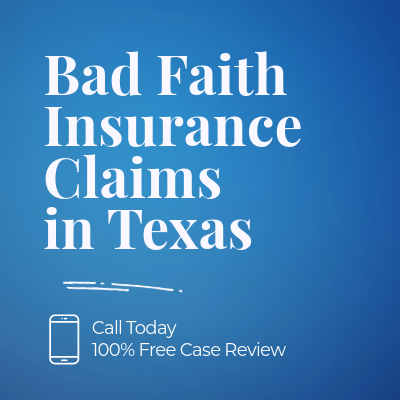You might have come across the phrase “bad faith insurance” without fully understanding its implications
Essentially, bad faith insurance refers to a situation in which an insured individual has a grievance against an insurance company due to its unlawful and inappropriate handling of claims.
Insurance companies are bound by a duty of good faith and fair dealing towards their clients, be they individuals or businesses.
If you suspect that an insurance company has not acted with fairness and good faith, you may be entitled to file a bad faith lawsuit against them on the grounds of common law bad faith and statutory violations in Texas.
Texas insurance companies have a duty to deal fairly and in good faith with parties during the claims process.
This includes ensuring that claims are adjusted promptly and settled equitably.
If an insurance company treated you improperly or unfairly, you have rights.
When an insurance company breaches its duties, it can be liable for damages, penalties, and attorney’s fees.
These damages and fees are in addition to what the insurance policy already owes the injured parties in bad faith insurance cases.
Get a Free Consultation Today!
Texas Bad Faith Insurance Law
There are two ways to bring a bad faith claim. A person can file a common law insurance bad faith law claim or a statutory bad faith claim.
Common Law Bad Faith
Common law bad faith claims rely on an implied covenant of good faith, requiring that insurance companies treat their customers honestly and fairly.
A successful Texas common law bad faith insurance claim must establish that an insurance company unreasonably denied or delayed a claim’s payment.
The injured party must also prove that the insurer knew or should have known there was no reasonable basis for doing so.
Statutory Bad Faith
Statutory violations allow a person to hold an insurer liable for damages caused by unreasonable delays in responding to and paying claims and misrepresentations regarding the policy, the claim, or coverage.
Chapter 541 of the Texas Insurance Code provides examples of an insurer’s unfair or deceptive acts or practices.
Under Chapter 541, an injured party can bring several different causes of action against an insurance company.
These include:
- Misrepresentation of a material fact or policy provision;
- Failing to settle in good faith when liability is straightforward;
- Failing to explain why the company denied a claim reasonably;
- Failing to affirm or deny coverage within a reasonable time, and
- Refusing to pay claims without conducting a reasonable investigation.
Bad faith typically requires a person to prove that the insurance company’s actions were not the result of an error. The injured party also carries the burden of proof.
This means the person must demonstrate precisely how the case facts meet bad faith claim requirements.
severe injuries demands serious results
Bad Faith Insurance Claims
An injured party can file a bad faith claim for almost any type of insurance, including auto and life.
Examples of bad faith behavior include:
- Failing to acknowledge a claim’s receipt;
- Canceling or changing insurance terms after an insured makes a claim;
- Misrepresenting insurance policy terms;
- Failing to conduct a prompt and thorough investigation;
- Ignoring portions of the claim during investigation and adjustment;
- Failing to assign qualified personnel to adjust and investigate claims;
- Unreasonably delaying claim adjustment;
- Delaying claim payments;
- Undervaluing claims;
- Failing to offer a prompt claim settlement;
- Pressuring a policyholder to forgo hiring an attorney;
- Failing to communicate with a policyholder;
- Requesting unnecessary information to delay the claim adjustment process;
- Alleging the insured engaged in fraud or criminal behavior without justification;
- Making payments without explaining what payments are for;
- Requiring physicians or claimants to submit numerous forms containing the same information and then using failure to submit as a reason for denial;
- Intentionally misrepresenting or misconstruing claim information;
- Withholding information about a claim, and
- Using threatening and abusive tactics to discourage claims.
Since words like unnecessary, reasonable, prompt, intentionally, and threatening can be subjective, it is always best to consult with an experienced attorney.
A skilled Houston insurance law attorney can review your facts and help you build a case against the insurance company.
Call Armstrong Lee & Baker LLP Today
At Armstrong Lee & Baker LLP, our bad faith insurance lawyers believe that the relationship between our firm and clients represents a sacred trust.
Our first and most important value is our commitment to our client’s best interests.
If you believe an insurance company acted in bad faith when dealing with you, contact us at 832-402-6637 and let us earn your confidence.
We offer free consultations and only charge a fee if you win.
Where You Can Find Our Houston, TX Office

